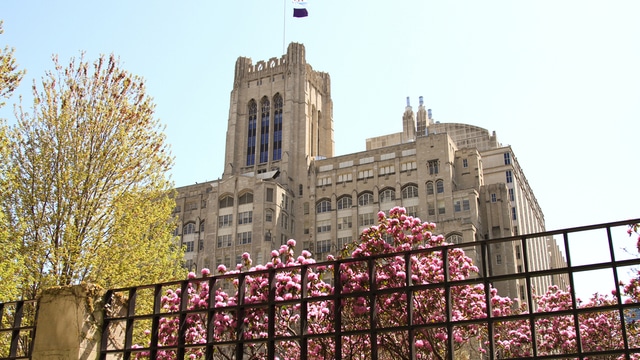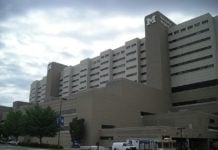Since 1859, Chicago’s Feinberg School of Medicine at Northwestern University has trained medical professionals dedicated to service and compassionate care. Feinberg students work in the school’s clinics and community programs, embodying the school’s commitment to social engagement.
In 2002, Northwestern University Medical School was renamed the Feinberg School of Medicine, after a large donation from the Joseph and Bessie Feinberg Foundation. Several centers were established as a result of the new funding, including the Feinberg Cardiovascular Research Center and the Clinical Neurosciences Institute.
A new biomedical research center opened in 2019; as part of the massive McGaw Medical Center of Northwestern University, the program has access to exceptional facilities, faculty, research partners, and project teams.
Rich clinical opportunities in the Chicago area, excellent research divisions in numerous fields of medicine, and a mission of service to the community make this competitive program a great place for diversity and innovation.
The program seeks students who share the school’s commitment to medical service and to the community and can forge new paths while still knowing how to be part of a team.
Northwestern Medical School Acceptance Rate

The Feinberg School of Medicine’s acceptance rate demonstrates the school’s selective admissions, with an overall rate of under 2% for the most recent incoming cohort.
This year’s shallow rate—previous years hovered at 2.2% or 2.3%—can be explained by the increase in the applicant pool seen at many schools during the 2021 application cycle.
Qualities most accepted students share include participation in undergraduate research (98% of the incoming 2021 class completed research as an undergraduate) and experience in teaching (152 out of 160).
Candidates do well when they demonstrate a wide range of interests in their application materials. Over a third of the incoming 2021 class took a gap year, and about as many studied abroad.
The admissions committee looks for some diversity of experience, including in undergraduate coursework: in addition to required pre-medical science courses, the school encourages coursework in the humanities and social sciences.
Many students accepted at Feinberg complete extensive clinical work before applying. The admissions requirements do not officially include clinical experience, but Feinberg reports that accepted students, on average, have logged 200-300 hours of volunteer or work experience in hospitals or in other clinical settings.
Feinberg does offer an Early Decision Program for candidates ready to commit to Feinberg if accepted. Early Decision allows students to complete a variety of undergraduate coursework without the stress of medical school applications ahead of them.
Northwestern Medical School Tuition
While current tuition at Feinberg is $66,096, the total annual cost for attending Feinberg comes in just under $100k.
Northwestern breaks down the tuition, insurance fees, and other costs for each year of the program, including expenses during intervening months, estimating costs for personal expenses, books, and transportation in order to provide a total picture.
The institution itself provides funding for 72% of current students, and the financial aid department also assists accepted students in locating federal and private loans and scholarships.
Acceptance to the program automatically considers candidates for a group of merit-based scholarships administered through the Office of Admissions.
Sample financial aid packages show how medical candidates at Feinberg combine need-based grants and scholarships with Stafford loans and other types of support in order to manage their tuition and expenses.
Once accepted to the program, FAFSA information and credit history will help determine eligibility for all programs. Students 26 and older, married students whose spouses are not students, or veterans do not have to provide parental financial information.
Students typically graduate Feinberg with debt a little under $200k, a little under the mean accrued debt for medical students graduating from private programs. The U.S. Bureau of Labor Statistics reports that annual salaries for most physicians exceed $200k a year, making this medical debt a less daunting proposition.
Northwestern Medical School Requirements
Prospective students interested in applying to the Feinberg Medical School must have completed 90 semester hours of coursework at an accredited institution in the United States or in Canada; applicants must have earned a bachelor’s degree prior to enrollment.
While Feinberg admissions express no preference regarding undergraduate major, certain courses must be completed before enrolling. Two semesters each of biology, physics, organic, and inorganic chemistry are required; Feinberg strongly suggests students take courses in statistics, social sciences, biochemistry, and English composition.
Feinberg admissions does not require but looks favorably on additional coursework in genetics, public health, the humanities, and the social sciences. The committee will consider coursework completed at a community college, but they note that completing all required pre-med courses at a four-year college or university makes an application more competitive.
Candidates apply to Feinberg through the American Medical College Application Service (AMCAS) between June 1 and November 1. Neither Northwestern’s graduate school or Feinberg’s admissions department pre-screens the AMCAS applications; all candidates receive a supplemental application invitation.
The supplemental application for Feinberg includes short essay questions based on the candidate’s background as well as their knowledge of Feinberg’s mission. Applicants should be prepared to explain a considered purpose for attending medical school, and they should be able to portray themselves as an appropriate candidate for the program.
Applying to Feinberg requires MCAT test scores, but the scores can be submitted after an application is in process if they are not yet available. Feinberg does not super-score the MCAT; they see all MCAT scores from previous tests, but they do not combine the highest sections.
Feinberg reports no minimum GPA or MCAT as a requirement, but the median MCAT score for the incoming 2020 class was 520, and the median GPA was 3.91.
Applicants with scores lower than the mean should feature as many other positive factors as possible in their applications, including work experience, research experience, extracurricular activities, and any special circumstances.
Northwestern Medical School Notable Alumni
Feinberg alumni make exceptional contributions to medicine and to society in general.
Some are national policy leaders like Quentin Young, who co-founded the Medical Committee for Human Rights and Physicians for a National Health Program and John A.D. Cooper, first president of the Association of American Medical Colleges.
The program’s graduates bring groundbreaking discoveries and insights to the world of medicine. Infectious disease specialist Deborah Asnis discovered the first human cases of West Nile in the United States.
Neurologist David Holtzman’s work sheds light on Alzheimer’s disease. C. Richard Schlegel developed the vaccine now administered as Gardasil, preventing countless future cases of cervical cancer.
Some blaze new trails for doctors and for all professionals: Sandra Olsen became the first woman president of the American Academy of Neurology, John R. Lumpkin was the first African-American emergency room physician, and Carlos Montezuma, founder of the Society for American Indians and one of the first Native Americans to receive a medical degree.
Other intrepid graduates explore the universe, like Michael Barrett, NASA astronaut who took part in two International Space Station missions, and Joseph Kerwin, the first doctor in space, who later became director of space and life sciences at NASA.
Feinberg graduates show their sense of teamwork in other ways: Olympic medalist Debi Thomas went from figure skating to a new world of achievement as an orthopedic surgeon, graduating from Feinberg in 1997.
George Jewett, Feinberg’s first African-American student, graduated in 1893—he played college football at the same time, and Northwestern awards a trophy in his honor each year.
Directors and Presidents of academic departments and medical associations number among Feinberg’s alumni. The American Medical Association, the American College of Surgeons, the American Cancer Society, New York and Presbyterian Hospitals, colleges of medicine at UC-Davis, Baylor, and Penn State have all been led by Feinberg graduates.
Endocrinologist and pioneer of modern medicine Henry Stanley Plummer graduated from Northwestern’s medical program in 1898. He also helped another recent graduate, Charles Horace Mayo, found one of the most important medical clinics in the world.
Northwestern Medical School Ranking
Feinberg Medical School ranks among the top research-oriented programs. In a three-spot rise for 2021, Feinberg tied with the University of Michigan at number 15 among medical research universities nationwide.
For Primary Care, Feinberg also ranks among the top 40, and several individual programs stand out as well. Feinberg’s obstetrics and gynecology program ranks in the top 5 nationally, and its surgery, pediatrics, and internal medicine programs are among the top 25.
Northwestern Memorial Hospital, Lurie Children’s Hospital, Lake Forest Hospital, and the Shirley Ryan AbilityLab, all affiliate institutions of Feinberg, also receive national accolades for general services and for specific outstanding departments.
Northwestern Memorial’s neurology, geriatrics, cancer, and cardiology departments all rank among the top ten U.S. hospitals. Overall, U.S. News sets Northwestern Memorial as the number 10 hospital in the country.
The Shirley Ryan AbilityLab has been recognized as the top institution for rehabilitation services and physical medicine. The Lurie Children’s Hospital ranks in the top ten for urology, neonatology, and cardiology.
Feinberg ranks 15th in the nation for NIH funding, supporting the programs ever-widening research scope.
Should You Attend Northwestern Medical School?
Feinberg graduates see the medical field as a way of building and sustaining a better society.
The program commits firmly to diversity in its student body, and it expects graduates to enact a sincere call to serve the public need.
Feinberg’s bias-free curriculum stays under review from the task force on inclusion staffed by students, faculty, and staff. Every aspect of the program, from faculty development to clinical assignments, is shaped by the program’s common interests, and the Feinberg community works together to sustain growth and equity.
Anyone hoping to use medical practice as a way to enfranchise the marginalized, as a way to build community, and as a way to improve life for as many people as possible will find like-minded associates at Feinberg.
Extensive opportunities exist during clinical rotations to serve in clinics throughout Chicago, bringing health care where it’s most needed.
Medical school candidates who see their career as a health professional as a role extending to environmentalism, public health, social justice, and the common good will find a place to acquire the tools needed to practice medicine with exceptional insight, but they will also find a place to hone their ethical processes and to shape the role in which they plan to serve humanity.














